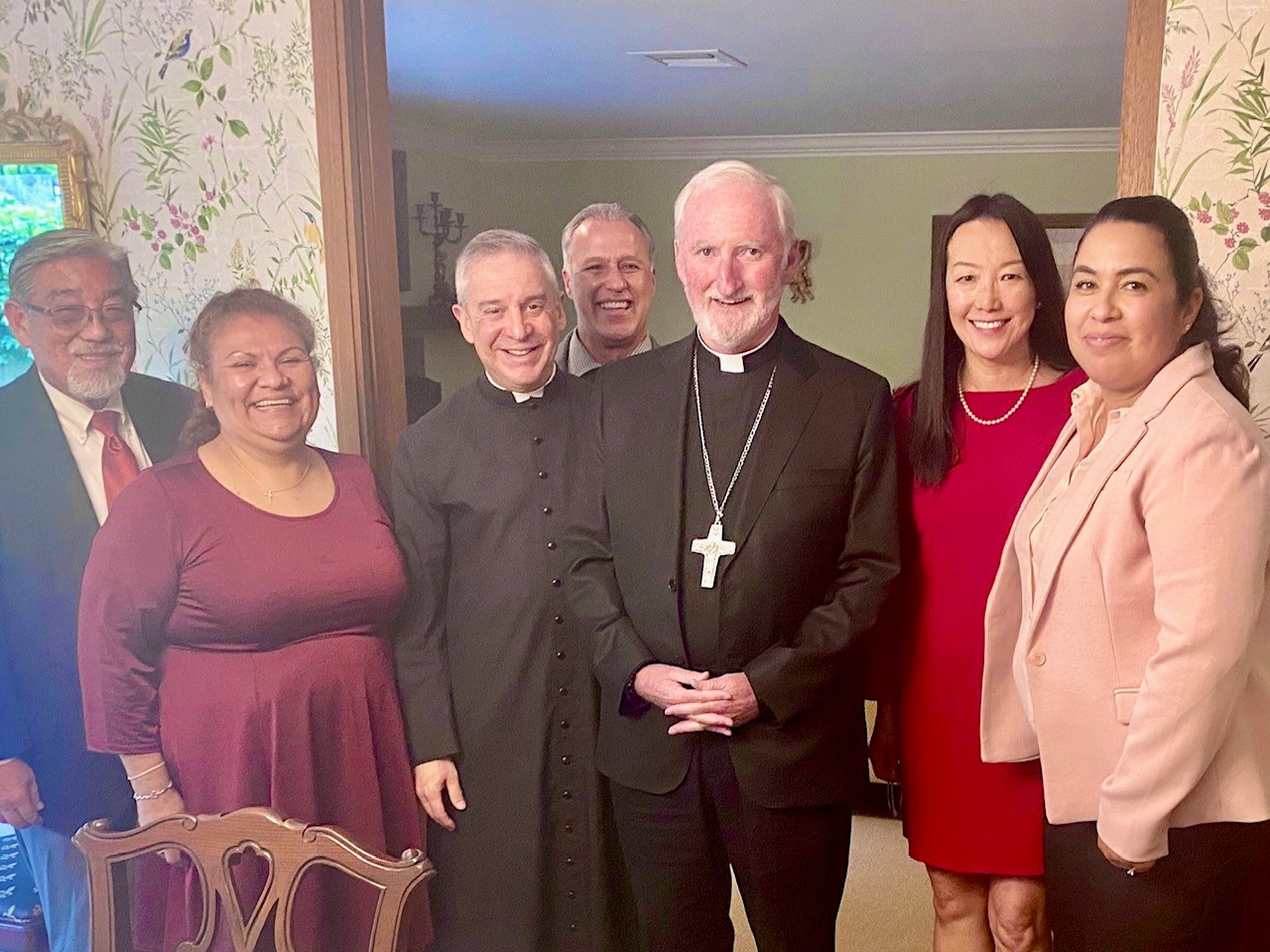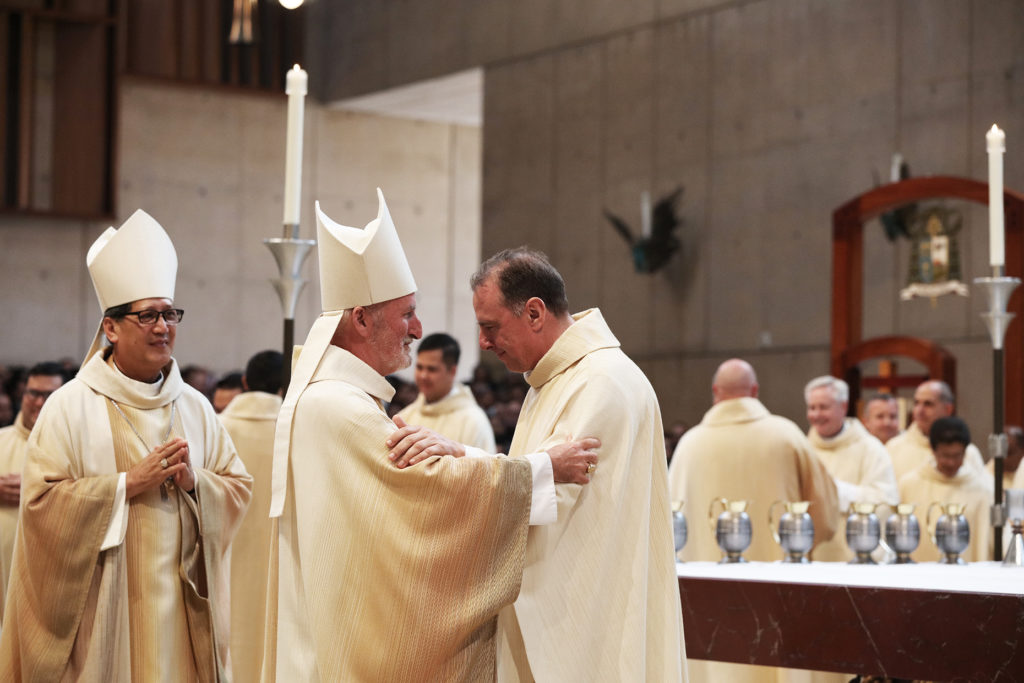This story is part of a series featured in a commemorative issue honoring Bishop David O'Connell. Read more stories at the Bishop Dave Commemorative Issue web page.
In the summer of 2020, an arson fire ravaged Father John Molyneux’s new parish. The historic Mission San Gabriel Arcángel was just a year away from the 250th anniversary of its founding. It was a moment of helplessness for parishioners who had invested so much spiritually in a building now rendered uninhabitable.
But if Molyneux saw his parish needed divine intervention at a time when COVID-19 was already causing tragic consequences, he can now recognize that it came in the form of Bishop David O’Connell’s presence.
“So many hearts were broken that day, and he was such a great comfort to all of us,” said Molyneux. “With Bishop Dave, it was like he was one-on-one praying with the people, meeting them amidst the rubble.”
As pastor, Molyneux considered the fire “a death in the community.” But two years later, O’Connell was there for its rebirth when it reopened last September at the close of its 250th jubilee year. Then last month, Catholics in the San Gabriel Pastoral Region where O’Connell served were shaken by the news of another violent act.
Before the fire, Molyneux said plans were in place to renovate the sacred gardens and remodel the museum, with architectural designs by a local Gabrielino-Tongva Nation member.
“Bishop Dave secured the funding for that entire project,” admitted Molyneux, who hopes to name a new memorial garden at the mission after O’Connell.
Father Marcos Gonzalez, pastor at St. Andrew Church in Pasadena, also served under O’Connell in the San Gabriel Region. Before that, the two were pastors in the same deanery, when Gonzalez was pastor at St. John Chrysostom in Inglewood and O’Connell served at St. Michael’s Church and St. Frances X. Cabrini Church, both in South LA.
Gonzalez replaced O’Connell as the area’s dean when he was made a bishop in 2015. But O’Connell continued to mentor him, including when Gonzalez arrived at St. Andrew in the summer of 2019 and had to confront several challenges in the parish.
“Out of the blue, Bishop Dave would call me, just to check in, always concerned,” said Gonzalez. “Usually when a bishop calls, there’s a problem. But there weren’t these times.”
Their relationship was key when St. Andrew became the first parish in the archdiocese to open with COVID-related restrictions after the pandemic lockdown. Gonzalez had to submit a reopening plan with extensive protocols to the regional bishop for approval. O’Connell replied within an hour.
“Thanks to him,” said Gonzalez. “He had a very practical head on his shoulders. His concern was always all about meeting the people’s needs and giving them access to the sacraments.” That kind of concern also helped bring together people of different faiths for important causes, said archdiocesan inter-religious officer Rt. Rev. Alexei Smith.

Smith remembered the rainy day in April 2016 when more than 60,000 people filled the LA Coliseum for “Azusa Now,” where several Catholic, Protestant, and ethnic community groups gathered to celebrate spiritual unity. Smith was one of the featured speakers, and he recalled O’Connell not only went with him, but stood at his side as he made his speech.
O’Connell went on to help start an outreach program for Catholics at Azusa Pacific University, a predominantly Evangelical Pentecostal school in his San Gabriel Region.
At the March 3 cathedral funeral Mass for O’Connell, an Episcopalian deacon recalled to Smith the time he recently met O’Connell at a local City Hall meeting to address the local homelessness crisis.
“The deacon told me at one point Bishop Dave turned to him and said, “Is this going to lead to doing something? Or are we just here to talk?” recalled Smith. “I knew at that moment,” the deacon told him, that “he was a man of action — he was the real deal.”
Msgr. John Barry, pastor at American Martyrs Church in Manhattan Beach, shared a special bond with O’Connell: Both were from the same region of Ireland, County Cork.
“We were born in the shadow of the same sky,” explained Barry. “But we were on opposite sides of the River Lee. This river has two branches, and it came together — coincidentally, where he was.”
In remarks at a special parish Mass celebrated for O’Connell the day of his funeral, Barry admitted he often received phone calls from O’Connell asking for help with education-related projects, like ones involving inner-city school scholarships.
“He was a Robin Hood of our time,” Barry said in his evening homily. “He knew how to put his hand in the pocket of those who could afford it, and spread it out to meet the needs of the poor. He never thought of himself.”
After getting back from the Friday funeral Mass, Barry heard from a parishioner asking if he could visit their mother and father, both in hospice care. They had made arrangements earlier with O’Connell to perform the anointing of the sick. O’Connell never made it.
“This shows he’s still very active,” said Barry of his old friend. “After this Mass, I will go to visit them with the sacraments as he would have done. He’s always inviting us to walk in the footsteps of the Lord.”
Capuchin Father Peter Banks was another one of O’Connell’s countrymen serving in Southern California. The two spent years serving together in South LA. When Banks, 77, was first sent to serve at St. Lawrence of Brindisi Church in Watts decades ago, he remembered feeling lost at first. Father O’Connell helped him.
“It was all about loving them, sharing laughs with them, that’s what David O’Connell had…” said Banks, wiping away tears in an interview before the March 3 funeral Mass.
“I’m very sorry I’m so emotional — I felt he was like a brother,” said Banks, now stationed at Mission Santa Ines in Solvang. He compared O’Connell to St. Oscar Romero, the martyred archbishop who took on social injustice and violence in El Salvador.
“I’ve never cried over a priest as much as I have over David. I prefer to be softhearted than hardhearted because that’s exactly how Bishop Dave would be.
“He always put his heart out there. It makes it so much harder the way he died. The tragedy adds so much to this. But hearing all that’s been said about him now, it’s an amazing resurrection of the people’s love for him.”

